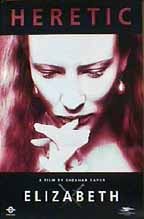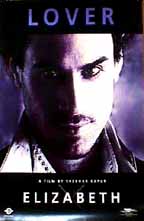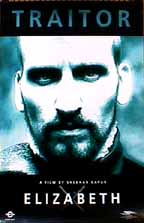 Elizabeth
(1998)
Elizabeth
(1998) Elizabeth
(1998)
Elizabeth
(1998)
Starring Cate Blanchett, Geoffrey Rush, Joseph Fiennes, Christopher
Eccleston, Richard Attenborough, Fanny Ardant, Kathy Burke, and John Gielgud.
Screenplay by Michael Hirst.
Directed by Shekhar Kapur.
Grade: B-
Review by Carlo Cavagna.
Elizabeth the Great was one of the strongest and ablest rulers in the history of England, but her power was not easily won. In fact, when she first ascended to the throne in 1558, England was threatened with invasions from abroad and civil war. Her predecessor, "Bloody" Mary, burnt hundreds in an attempt to restore Catholicism as England's single faith. To make matters worse, the line of succession had been hopelessly tangled ever since the death of Henry the VIII. After Elizabeth, no direct descendants of Henry remained, and there were many distant relatives with an interest in seeing her dead.
Elizabeth shows how Elizabeth (Cate Blanchett) ascends to the throne and consolidates her power. (For narrative convenience, many events are altered, compressed and juxtaposed.) Elizabeth's most immediate challenges are to calm the religious strife and to avert an invasion by Scotland and France. Elizabeth's advisors, among them Lord Cecil (Richard Attenborough), are anxious that she marry a suitable husband as soon as possible and produce an heir. Elizabeth is reluctant to do so, and instead develops a relationship with Sir Robert Dudley (Joseph Fiennes). Dudley would not be a suitable husband, however, and becomes the focus of the other courtiers' jealousy.
 Meanwhile,
conspiracies against Elizabeth develop within her court and abroad, instigated
by the Duke of Norfolk (Christopher Eccleston), the Pope (John Gielgud), the
Spanish ambassador, and Mary of Guise (Fanny Ardant), regent for the underage
Mary Queen of Scots. Finally, with Sir Francis Walsingham (Geoffrey Rush) as
her hatchet man, Elizabeth strikes back at her enemies in a sequence that borrows
heavily from The Godfather. At the very end, Elizabeth symbolically marries
herself to England. Director Shekhar Kapur shoots her coming to meet her courtiers
from out of a pool of light wearing for the first time the asexual, cadaverous
clothing and makeup we associate with Elizabeth the Great. No longer does is
she a "mere" woman; she has become something greater.
Meanwhile,
conspiracies against Elizabeth develop within her court and abroad, instigated
by the Duke of Norfolk (Christopher Eccleston), the Pope (John Gielgud), the
Spanish ambassador, and Mary of Guise (Fanny Ardant), regent for the underage
Mary Queen of Scots. Finally, with Sir Francis Walsingham (Geoffrey Rush) as
her hatchet man, Elizabeth strikes back at her enemies in a sequence that borrows
heavily from The Godfather. At the very end, Elizabeth symbolically marries
herself to England. Director Shekhar Kapur shoots her coming to meet her courtiers
from out of a pool of light wearing for the first time the asexual, cadaverous
clothing and makeup we associate with Elizabeth the Great. No longer does is
she a "mere" woman; she has become something greater.
Elizabeth is an ambitious movie, but it doesn't succeed in telling the story of Queen Elizabeth especially well. It's impossible to keep all the characters straight, and the dark visual composition only makes matters worse. Although the story is bafflingly complex, some crucial elements are glossed over. There is no explanation for why Mary (Kathy Burke) is so bloodthirsty. More importantly, Kapur and screenwriter Michael Hirst do not fully explain Elizabeth's refusal to marry. The film alludes to the fact that Elizabeth hates the idea of being dependent on any man, and to a certain extent it shows how she plays her rivals off of one another by entertaining numerous marriage offers without accepting any of them. Ultimately, we are left to draw the conclusion that Elizabeth's attachment to Dudley is the primary reason she does not marry. This is, at best, an oversimplification, as the real Elizabeth's reasons were probably much more complicated.
What must be taken into account, but Elizabeth does not tell us, is
that Mary and Elizabeth came from what was quite possibly the most dysfunctional
family in recorded history. Their father was Henry the Eighth. Mary's mother
was Henry's first wife, Catherine of Aragon, whom Henry cast aside in order
to marry Elizabeth's mother, Ann Boleyn.  The
fact that Henry broke with Catholicism and founded the Church of England because
the Pope refused to annul his marriage to Mary's mother just might--just maybe--have
had something to do with Mary's fanatical persecution of Protestants. Henry
eventually tired of Ann Boleyn, as well, and had her beheaded.
The
fact that Henry broke with Catholicism and founded the Church of England because
the Pope refused to annul his marriage to Mary's mother just might--just maybe--have
had something to do with Mary's fanatical persecution of Protestants. Henry
eventually tired of Ann Boleyn, as well, and had her beheaded.
Elizabeth, who was barely one year old, fell out of favor at court until Henry married his fifth wife, Catherine Howard, who was a cousin of Ann. Catherine was the first of Elizabeth's stepmothers to show her any kindness, and Elizabeth was invited back to court and given a position of honor. Yet just eighteen months later, the same exact story repeated itself. Catherine was beheaded on the spot where Ann died. After Henry's own death a few years later, his last wife Catherine Parr remarried, and the teen-aged Elizabeth went to live with her, where more horrors awaited. She was almost certainly molested by her stepfather with the tacit, if not explicit, consent of her stepmother. We can assume that Elizabeth did not grow up with the healthiest respect for the institution of marriage.
None of these events and their possible impact on Elizabeth's psyche are explored, and the opportunity to add depth to the story is lost. Because motivations are unclear, the movie depends on its overpowering soundtrack to advance the narrative and raise the dramatic tension. Cate Blanchett gives a remarkable performance and bears a startling resemblance to the young Elizabeth as described in historical texts. However, the film, which is under two hours, should have been lengthened to clarify the plot and further develop the characters. Elizabeth is only a decent period suspense thriller and an inaccurate history lesson. It could have been a masterpiece.
Review © March 1999 by AboutFilm.Com and
the author.
Images © 1998 Polygram Filmed Entertainment. All rights reserved.
Read user comments on this review or send us a comment. We'll post the best comments!